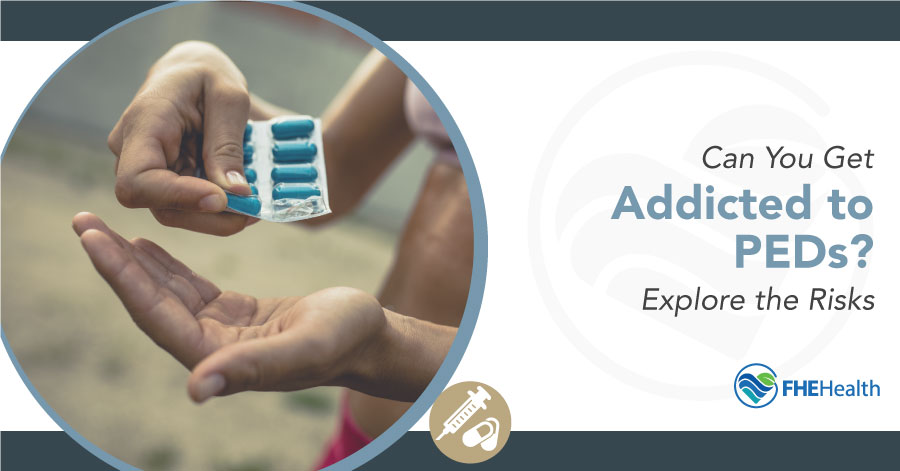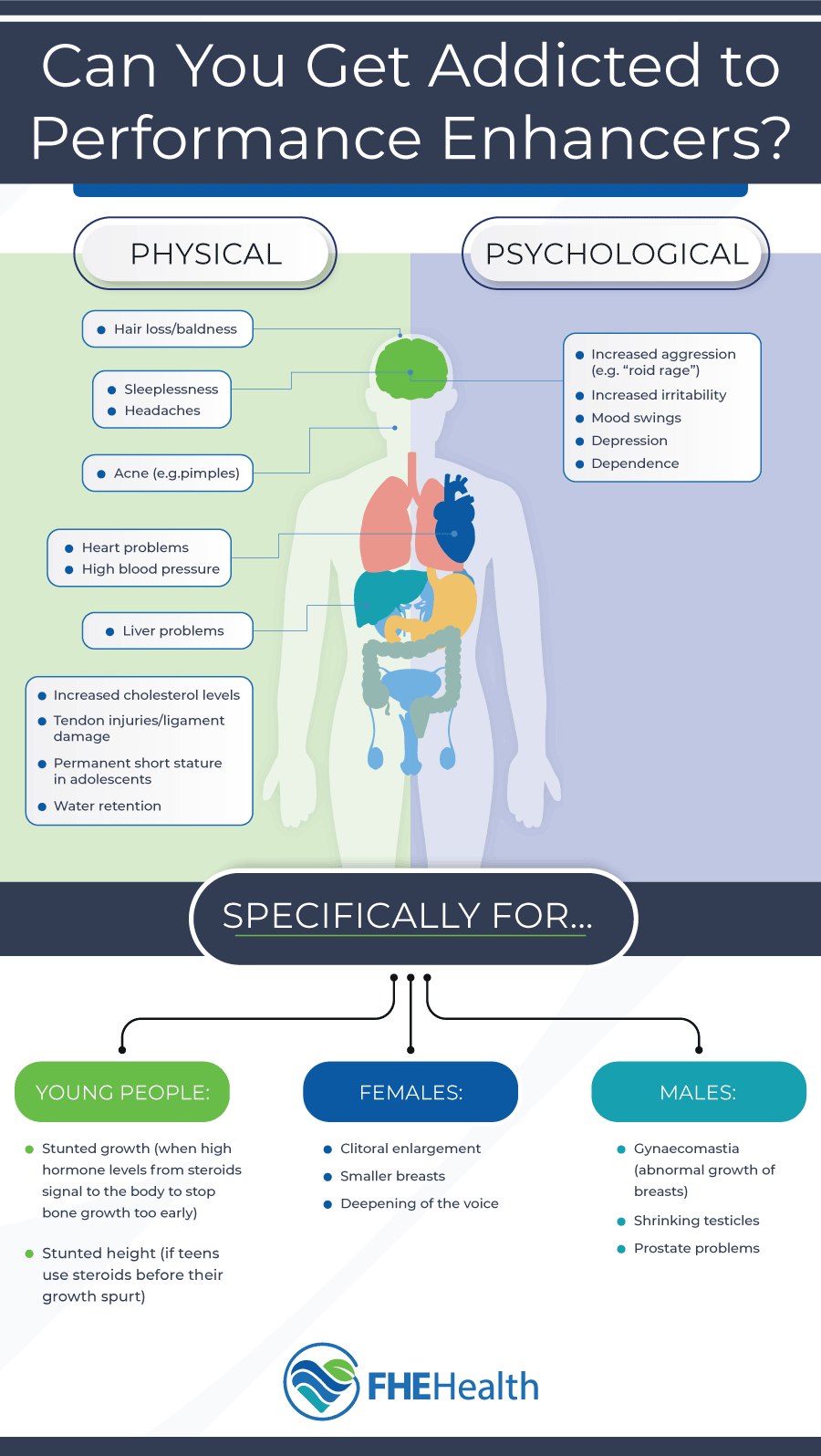
Competition in sports can be brutal, and athletes can go to extreme lengths to gain an advantage, even to the point of resorting to performance-enhancing drugs (PEDs). While most people have heard about anabolic steroids, many probably don’t know about the health risks and dangers of these drugs. Furthermore, where do PEDs fit with drug addiction and substance abuse, if at all? Can it be said that PEDs are “addictive,” and if so, how, and what’s the nature of these addiction risks?
Understanding What a PED Is and How They are Abused
What is a performance-enhancing drug? Performance-enhancing drugs are drugs that a growing number of athletes take to boost their physical performance and endurance and assist in muscle recovery following physical endurance during sporting activity or performance. Taking performance-enhancing drugs is also called “doping.” These PEDs include anabolic steroids, non-steroidal anabolics such as human growth hormone (HGH), androstenedione, diuretics, stimulants, creatine, and erythropoietin.
Research shows that anabolic steroids are more likely to be abused by athletes in sports that are strength-dependent, such as football and weightlifting, rather than sports emphasizing speed, endurance, agility, and flexibility.
The policies and rules governing the use of banned substances among the professional leagues, including Major League Baseball (MLB), the National Football League (NFL), the National Baseball Association (NBA), and the National Hockey League (NHL) vary, although drug testing and drug-related suspensions have become common over the last two decades, with highest instances in the NFL and NBA. Indeed, for more than three decades, steroids have been the narcotic drug most commonly misused in the NFL.
Testing may be regular or random, depending on the league. And, in the case of the National College Athletics Association (NCAA), testing programs are determined by the institutions affiliated with the association and vary widely. Thus, athletes, particularly in professional sports, may believe the risk of using anabolic steroids and other performance-enhancing drugs is something they can get away with. They are often driven by the promise of multi-million dollar contracts paid upon their performance stats, which they know they can boost with the help of PEDs.
PEDs can be taken orally or injected into body muscles, and some steroids are popularly applied via topical creams or gels. There’s also the practice of blood doping, which involves blood transfusions to boost the body’s capabilities of carrying oxygen. Stepping up use and continuing to abuse PEDs can lead to dependence and addiction.
How PEDs Can Be Compulsively Abused
Steroids in sports is a problem that coaches and athletes know quite a bit about. Not only is the practice of doping enough to perhaps lead to suspension from competing or participating in professional sports teams, but it’s also a problem among high school and college athletes and athletes competing in the Olympics and other high-profile competitions.
Some athletes may believe they’re invincible or can get away with taking PEDs surreptitiously and simply ignore the risks of using steroids or other performance-enhancing drugs. Athletes take anabolic steroids and human growth hormone (HGH) to increase muscle strength and mass and stimulants to boost levels of energy to enable longer workouts.
Many athletes, seeking to make a name for themselves and garner attention for their athletic prowess and performance, go well beyond the recommended dosages for performance-enhancing drugs, thinking that more is better and will lead to even greater gains. Their doses taken for non-medical purposes, according to the National Institute on Drug Abuse (NIDA), are 10 – 100 times higher than doses recommended for medical reasons. Yet the benefits these athletes hope to achieve may not accrue. Instead, it’s more likely that the number and severity of the side effects of abusing PEDs will increase.
How Do People Misuse Performance Enhancers?
Most people abusing steroids are looking to rapidly increase their muscle mass or improve their athletic ability. They believe steroids are a quick and easy way to achieve their goals, but the physical and psychological side effects can be debilitating.
So, are steroids addictive? Doctors will prescribe steroids to be taken safely in certain circumstances, but if abused, steroids can and will induce addiction. Steroid use signs can be physical and behavioral. Hormonal imbalances can cause hair loss and infertility, as well as paranoia, irritability and mood swings.
It’s hard to know how to tell if someone is on steroids, much less misusing them. It’s common in steroid abuse to cycle or combine steroids to enhance their effectiveness or decrease side effects — though there’s no evidence to support that this actually works.
These different approaches are known as stacking, pyramiding and cycling:
Stacking
A person “stacking” steroids is taking two or more types of performance enhancers at once. Because steroids come in multiple forms, they’ll usually use a combination of oral and injectable options. Using multiple steroids is believed to increase their efficacy and get the user fast results. Unfortunately, not only is this untrue, but it significantly increases the risk of overdosing on steroids.
Pyramiding
Someone who chooses to “pyramid” takes their steroids in a cycle. They start with a low dose of steroids, then gradually increase the amount they take. The goal is to reach the maximum allowable dose of steroids by the middle of the cycle. When they reach their maximum, they begin to slowly decrease their dose back to the lowest possible.
Cycling
Some people will cycle “on” and “off” of taking steroids. An “on” cycle will generally last between 6 and 12 weeks, depending on the person. The “off” cycle — when the person doesn’t take steroids at all — also varies and is meant to reduce damage to internal organs. During an “off” cycle, it’s believed the body will continue manufacturing its own testosterone, though this isn’t necessarily true — and steroid abuse will still cause hormonal disruption.
Dangers of Regular PED Abuse
While some athletes may persist in abusing performance-enhancing drugs, they do so at considerable risk. Also, while there haven’t been any studies evaluating long-term health risks of performance-enhancing drugs used to boost athletic performance, any short-term benefits are well known to come with numerous risks. The dangers of PEDs cover the gamut of physical ailments and conditions affecting men and women, depending on the type of performance-enhancing drugs used.
Stopping the use of performance-enhancing drugs is risky as it involves dealing with not only the loss of muscle mass and strength, performance decreases, and lower flexibility and concentration—but also the onset of side effects. These may include problems with fatigue, withdrawal symptoms from the abrupt cessation of drugs, skin that suddenly sags, difficulties with mental acuity, increased body fat, and overdose.
Anabolic Steroids
Regular abuse of anabolic steroids can result in tumors of the liver and kidney problems, while the mental effects of abusing these performance-enhancing drugs may include intense rage, paranoid jealousy, delusions, mania, and impaired judgment. Injecting anabolic steroids increases the risk of contracting and/or transmitting HIV/AIDS and hepatitis. Other dangers with long-term use of steroids include an enlarged heart, stroke, heart attack risk increase, and blood clots.
Gender-specific dangers include increased breast size in men, baldness, testicle shrinking, lowered sperm count, and elevated risk of prostate cancer. In women, anabolic steroid abuse can result in decreased breast size, baldness that’s similar to the male pattern, enlarged clitoris, deepening voice, increase in facial and body hair, and cessation or other changes in the menstrual cycle.
Withdrawal from steroid abuse produces symptoms such as fatigue, cravings for steroids, sleep difficulties, restlessness, reduced sex drive, and loss of appetite. A serious withdrawal problem with the cessation of steroid use is the onset of depression, which may prompt thoughts and actions about suicide.
HGH
Taking higher than recommended dose injections of HGH can lead to several problems, not the least of which are carpal tunnel syndrome, development of diabetes and insulin resistance, increased organ growth of bones or organs, arthritis, pain and discomfort in joints, and increased water retention. High amounts of injectable HGH, particularly when the drugs are obtained from illegal online sources, can result in an overdose. Impairment of the pituitary gland, which may be irreversible, can cause the pituitary to be unable to produce the body’s natural supply of human growth hormone.
Stimulants
Among the stimulants abused by athletes is medication to treat attention deficit hyperactivity disorder (ADHD). Among the dangerous side effects of ADHD drug abuse (of Adderall, for example) is high body temperature, an increase in heart rate, higher blood pressure, agitation, tremors, and muscle spasms or shakes. Serious side effects include shortness of breath, seizures, severe headache, confusion, blurry vision, fainting, and weakness on one body side. Extremely risky stimulant use occurs when combining the drug with alcohol, which could lead to overdose, coma, and death.
Diuretics
Misuse of diuretics can lead to severe dehydration, and a sudden drop in potassium, which could be life-threatening.
The risk of using anabolic steroids and other performance-enhancing drugs simply isn’t worth taking.
How to Treat “Addiction” to These Supplements/Drugs
Although performance-enhancing drugs don’t produce the neurochemical high that so often leads to addiction with other substances, a research report from the NIDA reveals that some percentage of those who abuse anabolic steroids may develop steroid use disorder. Like other substance use disorders, a steroid use disorder entails the compulsive use of steroids despite mounting negative health and other consequences, such as avoiding activities one once enjoyed or spending a disproportionately high amount of time, money, and energy getting PEDs.
According to the NIDA report, a majority (56 percent) of anabolic steroid users do not look for treatment to get off drug use. Furthermore, they don’t tell their doctors about taking those drugs.
After taking these performance-enhancing drugs and supplements long enough to become dependent and/or addicted to them, getting off this risky regimen and mindset may require professional treatment. Without question, finding alternative ways to naturally increase energy, improve muscle resilience and reduce fatigue, and help with physical recovery following high-intensity physical sport can be a challenge. It will require a willingness to forego the quick-fix solution that PEDs such as anabolic steroids provide, plus dedication, guidance from medical or other professionals, and healthier ways to train, compete, and rebuild and restore depleted physical reserves.
Treatment for anabolic steroid addiction currently involves getting at the underlying roots. Often, these are behavioral in nature. The user isn’t so much physically addicted to the chemical high of the substance as they are hooked to the outcomes that they have come to associate with taking steroids (better performance, achievement, and/or a more muscular or athletic physique). Counseling and psychological therapies and medications, such as endocrine therapies and antidepressants, may be an appropriate treatment approach. For steroid users who also misuse opioids, treatments including pharmacological and psychosocial approaches may be prescribed.
If you or a loved one are struggling with dependence or addiction to performance-enhancing drugs, take the first step to get the treatment that can help in overcoming this difficult situation. Call or contact FHE Health today for a confidential discussion of treatment approaches, including behavioral therapies like cognitive behavioral therapy (CBT) and medications that may be beneficial in turning the corner on abuse of PEDs and anabolic steroids.







